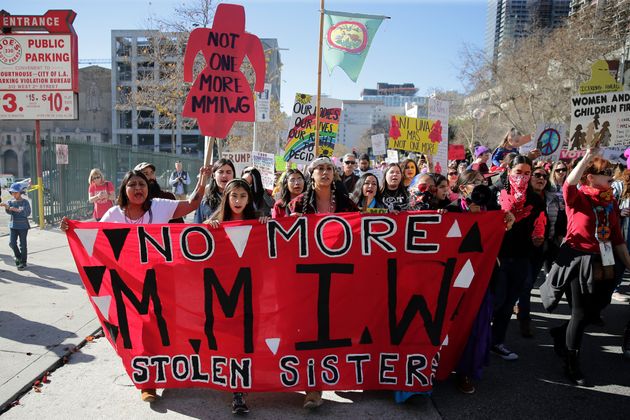Trump Signs 2 Laws Addressing Missing And Murdered Indigenous Women
- Home /
- Latest News /
- Trump Signs 2 Laws Addressing Missing And Murdered Indigenous Women
H K Sethi JFI
- Latest NewsPoliticsU.S.
- October 11, 2020
- 0

SARAH MORRIS VIA GETTY IMAGES Activists march for missing and murdered Indigenous women at the Women’s March on Jan. 19, 2019, in Los Angeles.
Native women are disappearing and being killed. Savanna’s Act and the Not Invisible Act will finally help bring them some justice.
The first bill, Savanna’s Act, will help law enforcement better respond to a devastating situation in which nobody can say what, exactly, is going on. At least 506 Native women and girls have gone missing or been murdered in 71 U.S. cities, including more than 330 since 2010, according to a November 2018 report by Urban Indian Health Institute. And that’s likely a gross undercount given the limited or complete lack of data being collected by law enforcement agencies.
Ninety-five percent of these cases were never covered by the national media, and the circumstances surrounding many of these deaths and disappearances are still unknown.
Savanna’s Act, authored by Sen. Lisa Murkowski (R-Alaska), is as much an attempt to put attention on the issue as it is to understand the severity of it. The new law will boost coordination and data collection between tribal, local, state and federal law enforcement in cases involving missing and murdered Native women. It will require federal agencies to get recommendations from tribes on how to enhance the safety of Native women, and require new guidelines for responding to these cases, in consultation with tribes.
Lots of these disappearances and murders stem from domestic violence, sexual assault and sex trafficking. Eighty-four percent of Indigenous women experience violence in their lifetime, and in some tribal communities, Native women are murdered at rates that are 10 times the national average.
Murkowski’s bill is named for Savanna LaFontaine-Greywind, a 22-year-old Indigenous woman who was abducted and killed in North Dakota in 2017. She was eight months pregnant and her baby was cut from her womb.
The other bill Trump signed, the Not Invisible Act, would make the federal government step up its response to Indigenous women going missing, being murdered or being forced into sex trafficking.
“Today we’ve reached a huge milestone in our efforts to provide justice for victims, healing for their families, and protection for women, children, and families across the nation,” Murkowski said in a statement. “I’m proud that we have elevated this issue from raising awareness, to action — having created enduring policy to make real, lasting change. … Today we are reminding these families, they matter and their loved ones who are lost matter.”
Trump tweeted that he was proud to sign the bills into law.
The White House put out a lengthy statement about Trump signing the two bills, boasting of the president’s leadership on the issue.
In reality, while his signing of these bills is a positive development, Trump’s record on tribal issues has been harmful and wildly offensive for years.
